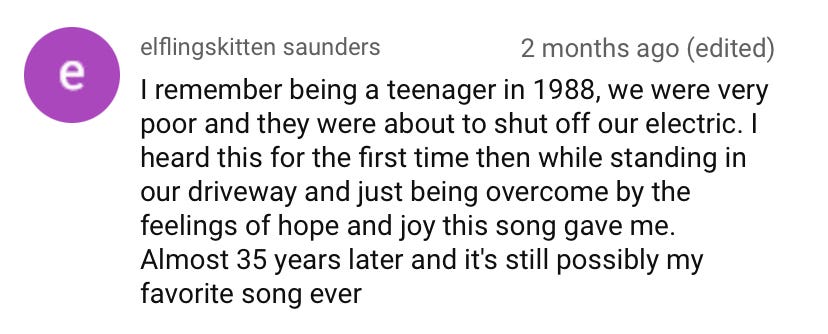Band Feuds, Sad YouTube, Celebrity Diaries, and The Island of Dr. Moreau
A few pop culture rabbit holes for your Wednesday
Hey! Welcome to the first official entry of Microfascination. In this issue you’ll find a question, an archive, an ethical dilemma, and a recommendation.
A Tale of Two Bands
Here’s a question: If two versions of a band exist, which is the “real” one? Does it come down to which group was created first? Which features the original singer? What about who owns the trademark?
I first wondered about this while reading up on the new wave group When in Rome. (If your memory needs jogging, this link will take you back to 1987, and this one to 2004.) Now, there are definitely two different versions of this story depending on who you talk to, but the gist seems to be that singers Clive Farrington and Andrew Mann parted ways with keyboardist Michael Floreale in 1991.
Years later, their hit single “The Promise” appeared on the soundtrack for Napoleon Dynamite. Renewed interest in the band inspired Floreale to pair up with a new lead singer and begin touring as When in Rome II. When Farrington and Mann decided they wanted to tour again, they discovered Floreale’s recent trademark of When in Rome meant they’d have to go by “Clive Farrington and Andrew Mann formerly of When in Rome” in the U.S. Not quite as catchy.
Post-grunge band Fuel took me down a similar rabbit hole. (Click here to travel back to 1998.) Fuel’s lead singer, Brett Scallions, officially departed Fuel in 2006 and three years later formed a cover band of Fuel (called Re-Fueled) with Fuel bassist Jeff Abercrombie. Their situation appears less acrimonious than When in Rome’s, although probably pretty awkward for the singer who’d stepped into Scallions’ shoes after he left Fuel. The following year, Re-Fueled broke up and Scallions returned to Fuel — but on the same day, everyone else in Fuel quit. So Scallions was right back where he started, minus all the other original members.
So, was Re-Fueled more “Fuel” than Fuel? Is Fuel still “Fuel” if the lead singer is the sole original member? Is Floreale’s group the true When in Rome, since he retains the trademark? Capitalism might say yes, but I’m more interested in essence than technicality. People often liken bands to marriages, but to me this isn’t quite a custody battle. It’s a fight over something more abstract — an idea, maybe, or a memory. “Nobody cares about When in Rome!” Floreale reportedly told Farrington in the midst of litigation. At the risk of getting too philosophical, I’m still wondering what When in Rome is, at its core, in the first place.
Sad YouTube: An Unexpected Internet Archive
I’m perennially interested in the way strangers seek connection online — digital messages in bottles, as I called them a few weeks ago. As a result, I’m always on the lookout for little pockets of community that retain the sincerity of the early internet era. Recently I noticed this in the comments section below YouTube music videos, where strangers often share incredibly personal memories of loss or joy that somehow tie back to the song. Once I started googling around, I discovered that someone else had the same epiphany — and not only that, created an entire archive in effort to preserve these stories.
“It’s a repository of memories, stories, and dreams, an accidental oral history of American life over the last 50 years written by the site’s millions of visitors every day,” writes Mark Slutsky of the motivations behind his project, which he called Sad YouTube. If you’re not in the mood to sift through all the usual noise in the comments yourself, this website is a total treasure trove.
Was I Actually Supposed to Read Alan Rickman’s Diaries?
I was thrilled when Madly, Deeply was published back in October. We’re talking 450+ pages of the actor’s signature wit and behind-the-scenes insight into over twenty years of film, peppered with hot takes about the industry (“Jurassic Park—what the hell is the plot? Great dinosaurs”). Back when the book was announced, The Guardian reported that Rickman had written his diaries with the intent of eventual publication. The book also received the approval of his widow, Rima Horton, who wrote a really touching afterword. Once I actually had the book, though, this quote from editor Alan Taylor’s introduction caught my eye:
“We do not know whether Alan would like to have seen his diaries published but he did receive invitations to write books which could have drawn upon the material in them.”
I’m someone who thinks a lot about celebrity, privacy, and consent, so the larger topic of posthumous diary publication turned into a bit of a deep-dive for me. Unsurprisingly, what I turned up was often rife with scandal or ethical concerns. Do y’all know about the Hitler diary hoax? Ted Hughes burned the last two years of Sylvia Plath’s journals. There are SO MANY myths about Anne Frank. And not a diary, but the release of Aaron Carter’s memoir was recently delayed following statements from Hilary Duff and Carter’s own publicist. In short, it never hurts to do your research when a book is announced after the writer’s death.
Coming back to Madly, Deeply — Rickman’s death wasn’t sudden, so presumably he did have the chance to make his preferences clear to his wife before he died. (My best guess is he figured, Well, I’ll be dead, so time to let Ewan McGregor know what I really thought of him!) Still, it’s strange that Taylor’s note in the intro feels at odds with the marketing line touted in The Guardian, and I wish I’d been able to locate further clarification. Maybe “seen” is the key word here, since they were published posthumously.
Revisiting The Island of Dr. Moreau
Maybe you remember The Island of Dr. Moreau — the fraught 1996 film adaptation of H.G. Wells’ classic sci-fi story about the repercussions of man playing god, now widely considered to be one of the worst movies of the decade. Production was notoriously plagued with rewrites, recasting, and even a change in director. In the end, most consider Moreau’s theatrical cut a graveyard for what could’ve been. While there’s definitely the occasional viewer who thinks it’s a misunderstood masterpiece, there’s one thing just about everyone agrees on — this movie is deeply weird, and Marlon Brando seems to be engaged in a contest with Val Kilmer to see who can make it weirder.
Personally, I’ve fallen a little bit in love with making-of documentaries. There’s nothing I love more than unraveling the mystery of how a piece of art works, and behind-the-scenes docs visualize the creative process in the same way a craft essay might illuminate a piece of writing to its reader. After Sandi Tan’s Shirkers, I think Lost Soul: The Doomed Journey of Richard Stanley’s Island of Doctor Moreau might be my favorite. The doc provides an enlightening look at the collision of capitalism and art as the filmmakers interview actors and industry reps about what went wrong. Slashfilm published a pretty comprehensive deep-dive on the film’s troubled legacy earlier this year, but if you have the time, Lost Soul is currently available to watch for free on Tubi (and no, you don’t need to see Moreau in order to enjoy it).
Thanks for being here, friends. Feel free to share your own November microfascinations if you like, and I’ll see you again in a month!





Marlon Brando and Val Kilmer spend the entirety of The Island of Dr. Moreau competing to see who can do a better impression of "Marlon Brando." Literally, at one point. It's gold.
Great post! I particularly love the Sad YouTube section. A few years ago, I was working on a piece about something that happened when I was in high school, and I was curating a playlist to remember what it was like being fifteen. I searched “December” by Lydia on YouTube, and the top comment on the first video was a personal story that’s stuck with me ever since. Very cool that others have noticed this trend in YouTube comments.